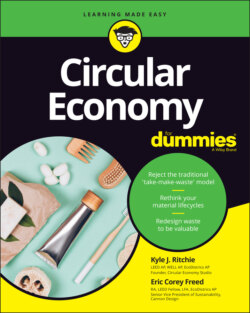Читать книгу Circular Economy For Dummies - Eric Corey Freed - Страница 67
The Drive to Be in Compliance
ОглавлениеBusiness compliance refers to how a company complies with the laws, regulations, and policies that govern its business. These compliance requirements vary from industry to industry and from location to location. Some industries, such as the chemical industry, are highly regulated because of their potential health risks. Other industries, such as the automotive industry, are highly regulated because of their potential safety risks. Lastly, still other industries, such as the financial industry, are highly regulated because of their potential fraud risks.
Companies with high regulatory requirements tend to have entire teams and departments focused on staying within compliance. Such regulations are enforced to protect the safety of the general public.
Compliance represents an important but expensive aspect of business operations. It sometimes takes a lot of money to stay within compliance, but companies pay up because they don’t want to run afoul of the law. The thing is, companies often assume that the cost of compliance is tied to the cost of doing business, but they rarely step back and question whether there was a better way to avoid the need for this compliance entirely.
For example, a company working with petroleum-based chemicals is highly regulated and needs to remain in compliance. If its leaders were to embrace circular economy principles, they could explore the use of plant-based chemicals that are not regulated.
Note: After every crisis, companies often face a flood of new regulatory compliances to deal with. After the great financial crash of 1929, new regulations and compliance requirements were instituted. After the great financial crisis of 2008, even more financial regulations and compliance requirements were put in place.
In a warming and more crowded world, expect that more regulations will come around, targeting waste and carbon emissions. Transitioning to a circular model can put your company ahead of the game, where you’re in compliance before any regulation of policies requires you to make a sudden change. It’s much better to make the changes now, at your own pace, than to be forced to make them quickly because of some pending legislation that's about to go into effect. Five hundred major organizations have seen the writing on the wall and have publicly signed on to the New Plastics Economy Global Commitment (www.newplasticseconomy.org), pledging to eliminate unnecessary plastic by using design and innovation.
